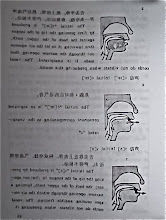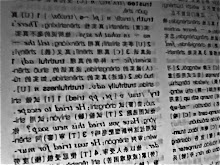III.
Puzzles. Contradictions.
Here we have this churl:
Rex Francorum, Rex Langobardoum, Imperator Romanorum—
for the love of God—who grudgingly slipped into
the chlamys only at the entreaty of Hadrian the Pope.
Never even went back to Rome after the coronation realpolitik.
This man, given to otter skins and tireless activism for
Liberal Arts education. Measuring up to, as disinterment
by the Victorian scientists evaluated, 6.2416 repeating
feet. This man, downright draconian when it came to
the conquest and conversion of the polytheists,
not to mention all the credal manipulations with the
Filoque, the spleenfulness over iconoclasm and the like.
We're discussing some serious standardization:
yes, there were the stable systems of manufacture
along with, for the times, impressive quality control.
But in his dim, hand-cramped scriptoria
we have the birth of the miniscule. And punctuation.
Finally a readable Benedictine rule.
This man who chafes at imperial coronation fancies
himself an administrator. Of all things. In the age
of high Christology, Alcuin settles into
Charlemagne's crude wooden throne.
There was the dance. More like orthopraxy,
if we are to do our due diligence in the matter.
Alcuin did his best to remain modest about it, though,
and I think we can comfortably say he was
successful—even gracious—in his humility.
And had he lived to see Middle English
and Old French he would have been broadly pleased
with the etymology of the word. Humilis,
"on the ground," from humus, "earth." Primary
meanings indicate semantic exactitude with
terra, but, of course, Alcuin understood
(the quickest glance at his palimpsests will assuage
your doubts on this one) that words do not work
this way. Charlemagne right around this time
would take the first steps of his dance,
the dance given to respectful observance of
the holy mysteries of the puzzle.
Yes, technically Alcuin had authored the puzzle:
as Charlemagne saw it was indeed the hand
of Alcuin that made the puzzle appear on the parchment,
but it was the mind of God that made the puzzle appear
in Alcuin's hand. Alcuin didn't disagree. In fact
couldn't, as there was not even available to him
in their day a theory of pure authorial intentionality,
and, if there was, it would have been impious
and therefore head-on heresy. But, in his characteristic
being-ahead-of-his-time, there was likely the smallest
mustard seed in his head about a theologically sound
framework for a trinity of God, man, and imagination
(with, and the etymology works beautifully here,
imagination serving as the Holy Ghost)
that wouldn't have toppled Aristotle's scaffolding
of the first mover, which, incidentally,
is the beginning of physics. Alcuin knew this,
even if he didn't have a word for it: that to be
a theologian is to be a scientist.



No comments:
Post a Comment